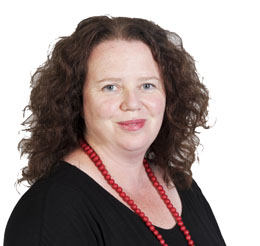Doctorate shows how writing can help cope with cancer
Brenton Stacey
Public relations officer
Avondale College of Higher Education
Cooranbong, New South Wales, Australia
Writing autobiographically about a life-threatening illness challenges culturally reductive readings of the sick as medicalised, marginalised or stigmatised, research by an Avondale lecturer shows.

Examiners describe Carolyn Rickett’s doctorate as making “a substantial and original contribution to critical discourse in . . . testimonial and therapeutic writing.” Credit: Aaron Bellette.
Dr Carolyn Rickett studied for her Doctor of Arts the published poetry and prose of authors diagnosed with cancer. She found by writing about the physical and psychic injury caused by the life-threatening disease, including the “impersonalisation . . . afforded to patients in biomedical settings,” an author of a creative text can “(re)imagine and (re)write this experience.” Because cancer has “the capacity to rupture a person’s sense of bodily integrity and orientation, the act of writing through this trauma can provide a strategic and enabling means through which to process and assimilate suffering.”
One of Carolyn’s first supervisors, Dr Noel Rowe, died from cancer before Carolyn completed the degree. She dedicates a paragraph to him in the preface of her thesis, quoting from his anthology A Cool and Shaded Heart, in which Noel writes of his initial treatment. “I’ve been visited by priests./ Old friends./ One of them anointed me with oils;/ I don’t mind at all./ (Who knows? Perhaps the sacrament may heal;/ perhaps it may even cure.)” Carolyn notes while the anointing did not “cure” the cancer, Noel’s poem enacts a “kind of healing . . . through conversation and the continuity of the written word.”
Examiners describe ‘Write yourself: your body must be heard.’ The therapeutic benefits of narrating a cancer experience as a “lucid, scholarly, rich and humane” work that makes “a substantial . . . contribution to critical discourse in . . . testimonial and therapeutic writing.”
Carolyn acknowledges “the great assembled cheer squad of family and friends” and her colleagues in the School of Humanities and Creative Arts, “a perennial source of ongoing support and inspiration.” Her Cavalier King Charles Spaniel, described by one of the examiners as a “sage research associate,” receives the final thanks in Carolyn’s thesis. “[Lily] has stayed up long past her bed time to discuss the merits of Derrida or navigate Freud’s ‘Mourning and Melancholia’—and has faithfully promised to revisit Blanchot again once her French improves.”
While conferred, Carolyn will graduate from The University of Sydney on November 9 this year.
